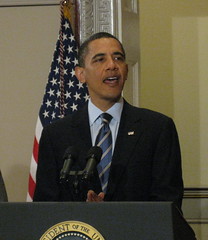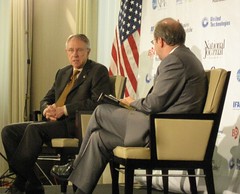Thursday
May282009
Introducing The New Nuclear Pandemic
By Celia Canon- Talk Radio News Service
Americans should be more concerned by the proliferation of nuclear weapons from North Korea to other states or non-state actors, rather than focus on a direct N.Korean nuclear attack on the Western World.
Such was the conclusion of former Secretary of Defense William Perry when addressing the Council on Foreign Relations (CFR) on U.S nuclear weapons policy today.
“When we are concerned about proliferation, for example from N.Korea to Iran, we are concerned with the possibility that nuclear terrorists might be a bomb... The greater danger is that the bomb or the fissile material leak from one of these countries.” said Perry.
On Monday, N.Korea announced that it had successfully detonated and underground nuclear bomb, and on Tuesday, it launched two short-range ballistic missiles. As a result, the Obama administration may be facing an unexpected turn in the nuclear debate.
The topic is gaining momentum as talks between the U.S and Russia on the renewal of the 1991 Strategic Arms Reduction Treaty (Start) are feared to be unsuccessful.
That N.Korea has nuclear capabilities and is testing missiles has fanned the flames on the necessity to reconsider the reduction in the Department of Defense FY2010 budget.
Perry was joined by Brent Scowcroft, former assistant to the President for National Security Affairs who explained that “a great danger in nuclear terrorism lies with the civilian nuclear power and the loose fissile material that comes with that.”
Scowcroft appealed to the security dilemma to provide a link between N.Korea or Iran acquiring a nuclear power and nuclear terrorism.
“If we don’t put a cap on proliferation now, we could easily face 30 or 40 countries with that capability, That is not a better world,” said Scowcroft, adding that “If [Iran and N.Korea] are free to enrich uranium to weapons grade, then you have others who want to do it just for protection or whatever and then you have a tremendous danger of terrorists getting hold of fissile material and then its relatively easy.”
The U.S government had already started to deal with this problem under the Bush junior administration, as Perry explains: “For one thing I support the initiative of the previous administration called the Proliferation Security initiative (PSI) and the recent moves to strengthen this initiative.”
Former President George.W. Bush said that PSI’s aim is "to keep the world's most destructive weapons away from our shores and out of the hands of our common enemies."
The initiative is limited to controlling alien ships in one’s waters to search for weapons. Airways are however not part of the PSI.
Americans should be more concerned by the proliferation of nuclear weapons from North Korea to other states or non-state actors, rather than focus on a direct N.Korean nuclear attack on the Western World.
Such was the conclusion of former Secretary of Defense William Perry when addressing the Council on Foreign Relations (CFR) on U.S nuclear weapons policy today.
“When we are concerned about proliferation, for example from N.Korea to Iran, we are concerned with the possibility that nuclear terrorists might be a bomb... The greater danger is that the bomb or the fissile material leak from one of these countries.” said Perry.
On Monday, N.Korea announced that it had successfully detonated and underground nuclear bomb, and on Tuesday, it launched two short-range ballistic missiles. As a result, the Obama administration may be facing an unexpected turn in the nuclear debate.
The topic is gaining momentum as talks between the U.S and Russia on the renewal of the 1991 Strategic Arms Reduction Treaty (Start) are feared to be unsuccessful.
That N.Korea has nuclear capabilities and is testing missiles has fanned the flames on the necessity to reconsider the reduction in the Department of Defense FY2010 budget.
Perry was joined by Brent Scowcroft, former assistant to the President for National Security Affairs who explained that “a great danger in nuclear terrorism lies with the civilian nuclear power and the loose fissile material that comes with that.”
Scowcroft appealed to the security dilemma to provide a link between N.Korea or Iran acquiring a nuclear power and nuclear terrorism.
“If we don’t put a cap on proliferation now, we could easily face 30 or 40 countries with that capability, That is not a better world,” said Scowcroft, adding that “If [Iran and N.Korea] are free to enrich uranium to weapons grade, then you have others who want to do it just for protection or whatever and then you have a tremendous danger of terrorists getting hold of fissile material and then its relatively easy.”
The U.S government had already started to deal with this problem under the Bush junior administration, as Perry explains: “For one thing I support the initiative of the previous administration called the Proliferation Security initiative (PSI) and the recent moves to strengthen this initiative.”
Former President George.W. Bush said that PSI’s aim is "to keep the world's most destructive weapons away from our shores and out of the hands of our common enemies."
The initiative is limited to controlling alien ships in one’s waters to search for weapons. Airways are however not part of the PSI.
tagged  1991,
1991,  Council on Foreign Affairs,
Council on Foreign Affairs,  DOD budget,
DOD budget,  Iran,
Iran,  North Korea,
North Korea,  Russia,
Russia,  START,
START,  Strategic Arms Reduction Treaty,
Strategic Arms Reduction Treaty,  Us,
Us,  William Perry,
William Perry,  ballistic,
ballistic,  bomb,
bomb,  brent scowcroft,
brent scowcroft,  civilian,
civilian,  debate,
debate,  fissile material,
fissile material,  fy2010,
fy2010,  george w bush,
george w bush,  nuclear missiles,
nuclear missiles,  nuclear weapons policy,
nuclear weapons policy,  president,
president,  secretary of defense,
secretary of defense,  terrorists,
terrorists,  underground,
underground,  western world in
western world in  Congress,
Congress,  Frontpage 1,
Frontpage 1,  News/Commentary
News/Commentary
 1991,
1991,  Council on Foreign Affairs,
Council on Foreign Affairs,  DOD budget,
DOD budget,  Iran,
Iran,  North Korea,
North Korea,  Russia,
Russia,  START,
START,  Strategic Arms Reduction Treaty,
Strategic Arms Reduction Treaty,  Us,
Us,  William Perry,
William Perry,  ballistic,
ballistic,  bomb,
bomb,  brent scowcroft,
brent scowcroft,  civilian,
civilian,  debate,
debate,  fissile material,
fissile material,  fy2010,
fy2010,  george w bush,
george w bush,  nuclear missiles,
nuclear missiles,  nuclear weapons policy,
nuclear weapons policy,  president,
president,  secretary of defense,
secretary of defense,  terrorists,
terrorists,  underground,
underground,  western world in
western world in  Congress,
Congress,  Frontpage 1,
Frontpage 1,  News/Commentary
News/Commentary 





TechAmerica Praises Obama’s Cyber Czar
TechAmerica held a media briefing in which they announced their collaboration with the government on the 60 day cyber security project which will create cyber security office.
The association of leading technology companies came out in support of President Barack Obama’s plan to tie public and private institutions together in the hopes of enhancing cyber security.
“The President came out and visibly made his commitment to this effort,” said Enrique Salem, CEO of Symantec.
President Obama said “We need to develop new standards for the cyber-security that protects our most important infrastructures, from electrical grids to sewage systems, from air traffic control to our markets."
John Brennan, Assistant to the President for Counterterrorism and Homeland Security, said “The national security and economic health of the United States depend on the security, stability and integrity of our nation's cyberspace, both in the public and private sectors."
“We clearly articulated what the risk are, what the threats are,” Salem said.
Phil Dunkelberger, CEO of PGP Corporation agreed, saying “I thought it was important that he (President Obama) linked cyber security to the future of the U.S.”
TechAmerica also affirmed its satisfaction for the new cyber security office regarding the security it will provide to small businesses and individuals.
Dunkelberger argued that “Those (security) rights should be encouraged and that is what the government does.”
On the new collaboration between the public and the private sectors Harriet Pearson said “The relationship that the administration is building is going to be key.”
Despite the efforts of the previous administration to address this topic, TechAmerica seems more enthusiastic about Obama’s plan.
Phil Bond said “ What makes it a fundamental shift is the personal commitment taken by the president”, adding that “He is putting a lot of chips on the table, politically.”
However, Salem warned that “I think its important that we do not let it get caught up in the bureaucracy.”